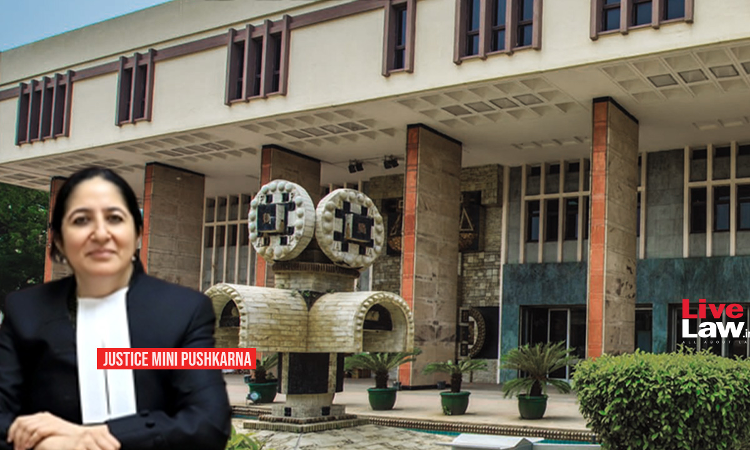- Home
- /
- High Courts
- /
- Delhi High Court
- /
- Availability Of Drug For Rare...
Availability Of Drug For Rare Diseases At Economical Prices Material Factor To Be Considered Before Restraining Via Interim Injunction: Delhi HC
Nupur Thapliyal
25 March 2025 10:55 AM IST
The Delhi High Court has observed that availability of a drug for treatment of rare diseases at economical and competitive prices is a material factor to be considered for grant of interim injunction in an intellectual property right (IPR) lawsuit. “A drug which is the only one available for treatment in India, for a rare disease, its availability to the public at large at very economical...
The Delhi High Court has observed that availability of a drug for treatment of rare diseases at economical and competitive prices is a material factor to be considered for grant of interim injunction in an intellectual property right (IPR) lawsuit.
“A drug which is the only one available for treatment in India, for a rare disease, its availability to the public at large at very economical and competitive prices, is a material factor which a Court will consider at the time of dealing with an application for interim injunction,” Justice Mini Pushkarna said.
The Court was dealing with a suit filed by F. Hoffmann-La Roche AG alleging infringement of patent by Natco Pharma Limited. The patent, a species patent, was titled “Compounds for Treating Spinal Muscular Atrophy” concerning the product “Risdiplam”. It related to compounds which were Survival Motor Neuron 2 used in the treatment of Spinal Muscular Atrophy (SMA).
Justice Pushkarna dismissed F. Hoffmann's plea seeking interim injunction seeking to restrain the alleged infringement of the suit patent, observing that Natco Pharma had prima facie raised a credible challenge as to the validity of the Suit Patent and that F. Hoffmann had been unable to make out a prima facie case for grant of an interim injunction.
The Court said that even though F. Hoffmann heavily relied upon the fact that there was neither any pre-grant opposition nor any post-grant opposition against the Suit Patent, but the said fact did not in any manner establish or guarantee the validity of the Suit Patent.
Natco Pharma had raised the issue of non-compliance of Section 8 of the Patents Act and that the F. Hoffmann ought to have made necessary declaration in Form-3 filed for the Suit Patent. On this, the Court said that whether or not there was any non-compliance of Section 8 of the Patents Act, is a finding that can be given only after appreciating the evidence on record, post the trial.
“This Court notes that the plaintiffs do not manufacture their drugs in India, but import their drugs into India. On the other hand, the defendant intends to manufacture the drug in India and make the product available at a price that is nearly 80-90% lesser than the plaintiffs‟ price. These factors are crucial in assessing the balance of convenience,” the Court said.
It further said that another material aspect which was crucial at the stage of interim injunction was that F. Hoffmann had shared the pricing of Risdiplam in India and the proposed effective price as part of Patient Assistance Program to National Rare Diseases Committee.
The Court noted that the Patient Assistance Program of F Hoffmann clearly does not resolve the issue of accessibility of the drug in question to the patients of SMA. It added that if F. Hoffmann provides the drug at its proposed price, even then, the same would not be a viable proposition in economic terms for the patients who are suffering from the rare disease.
The Court observed that Natco Pharma's proposal would bring to effect price reduction to the drug in its entirety, which would be applicable to all patients suffering from SMA.
“Therefore, this Court is not satisfied that on account of the proposed price, as given by the plaintiffs for providing the drug in question to National Rare Diseases Committee, as part of Patient Assistance Program, there is any leverage for grant of injunction in their favour,” the Court observed.
Furthermore, the Court said that the impact on the availability of the drug for general public, considering the economic scenario, cannot be accepted on the face of it at the stage of consideration of an application for interim injunction. It added that such facts and statistics would have to be established by F. Hoffmann during the course of trial, and its effect and impact cannot be countenanced in order to grant injunction in its favour.
It held that no prejudice shall be caused to F. Hoffmann as it can be compensated by damages. However, there exists no right for the public to lessen or compensate itself, the Court said.
“…. it is held that the defendant, i.e., NATCO Pharma Limited, has prima facie raised a credible challenge to the validity of the Suit Patent. Thus, this Court is not inclined to grant any injunction in favour of the plaintiffs and against the defendant. Besides, the plaintiffs can be compensated in damages, as held in the preceding paragraphs. Further, balance of convenience is also against the plaintiffs and is in favour of the defendant,” the Court said.
Counsel for Plaintiffs: Mr. Pravin Anand, Ms. Shrawan Chopra, Ms. Prachi Agarwal, Mr. Devinder Rawat, Mr. Achyut Tewari, Mr. Aayush Maheshwari, Ms. Elisha Sinha, Ms. Krisha Baweja, Mr. N. Mahabir, and Ms. Archana Shanker, Advocates
Counsel for Defendant: Mr. J. Sai Deepak, Sr. Adv. with Mr. Afzal B. Khan, Mr. Samik Mukherjee, Ms. Amrita Majumdar, Mr. Dominic Alvares, Mr. Avinash Kr. Sharma, and Mr. Sharad Besoya, Advocates
Title: F. HOFFMANN-LA ROCHE AG & ANR v. NATCO PHARMA LIMITED
Citation: 2025 LiveLaw (Del) 354

